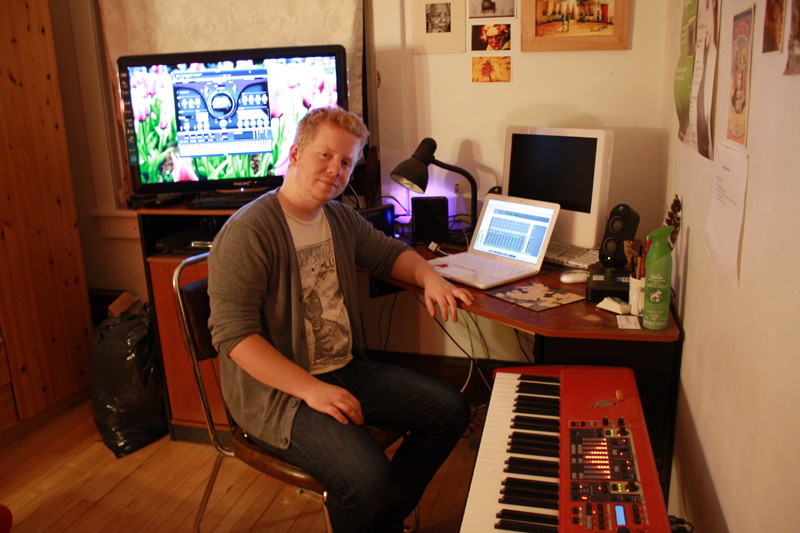When music is not for music’s sake
Composing film, television and video game scores is not just writing songs
Steven Webb enjoys watching movies and playing video games as much as the next person, but while these activities are mere entertainment for most people, every game Webb plays and every film he watches also counts as a sort of research.
Webb, a local composer, already has several credits under his belt, including two commissioned works for choral group Prairie Voices and a jazz piece which debuted at last year’s Jazz for Humanity fundraiser concert.
But now he has his eye on something different.
“I like the idea of a variety of different creative approaches coming together,” says Webb, 22. “I like the idea of creating music to enhance and really help tell a story.”
Adding his first film score credit to his roster this year for Goodbye Planet Earth, directed by local indie filmmaker Jeremy Rafuse, Webb hopes to expand his experience in the field with more work in film and video game composition.
The close relationship between a film or television program and the music that goes along with it means that the entire experience is heightened but that the music blends into the whole, which means less visibility for the art. The same is doubly true for video games.
“The music has to be very fluid and able to change on the fly depending on what’s happening in the game,” Webb says. “So if someone attacks you, for example, the music should be able to seamlessly change.”
People like Webb can’t just focus on their craft, however. In a field of music where most composers work freelance, getting yourself out there is crucial.
“(The industry) grows only as much as the relationships grow, because this business more so than any other business is about relationships,” says Shawn Pierce, a local television composer who currently writes music for a number of projects, including the television series Haven on the SyFy channel.
Pierce’s background in the music industry is extensive. He’s worked as an engineer, producer, songwriter or performer on more than 200 different albums and earned one Grammy nomination, 22 Juno nominations and five Juno awards.
“One of the key things when you’re starting out is to try to find opportunities to meet people who work in complimentary fields,” says Andrew Yankiwski, a partner in local recording studio Precursor Productions. “That would include forming relationships with up-and-coming producers and directors and people who are in digital media.”
There are a whole bunch of local organizations that can help those who are working or trying to get started in the field.
Manitoba Music, Onscreen Manitoba, Film Training Manitoba and New Media Manitoba are good places to start networking.
There is also The Secret Handshake, a grassroots industry group that meets monthly in the city to allow anyone who is interested to get to know the scene associated with new media – everyone from graphic designers to app developers.
“ I like the idea of a variety of different creative approaches coming together. I like the idea of creating music to enhance and really help tell a story.
Steven Webb, composer
Yankiwski says it’s one of the best ways to make connections.
“You get a room full of people who are all working on cool projects from all kinds of creative and technical areas,” he says.
These groups and the personal relationships that they foster are incredibly important. In an industry that could generously be described as insular, it matters very little which credentials an aspiring composer might have.
“Clients want to go with trusted people with a trusted track record and experience,” Pierce says. “So you’ll see prominent composers doing multiple shows.”
While Pierce attended Berkeley for a degree in film scoring, recent technology has largely eliminated the need for many composers in his field to have as thorough a musical background.
“Going and getting classical music training definitely helps,” says Webb, who graduated last year from the University of Manitoba’s School of Music. “But in terms of getting a job, no one’s going to be looking at that – no one cares. It’s all about the project you deliver in the end.”
That means a cohesive collaborative effort that results in a smooth final product. Pierce suggests the most important way to prepare is to watch a lot of TV or films to become as familiar as possible with how everything works together.
“In this business it’s not about the music, it’s about the show,” Pierce says.
Achieving the kind of work that film, television and gaming producers want means spending a lot of time alone in front of a computer and working to tight deadlines.
This less-glamorous side of the job may not be the first thing that comes to mind for most people. Pierce spends upwards of 12 hours per day locked away in his studio.
“I honestly really do think it’s fun. It’s a blast,” Pierce says. “Being able to manage the stress part of it is huge.”
Published in Volume 66, Number 6 of The Uniter (October 5, 2011)







